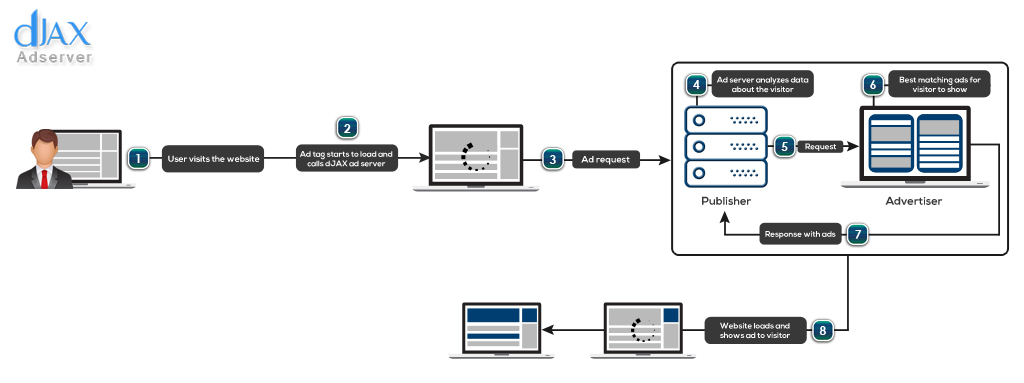- info@djaxadserver.com
- +1 408 786 5525
How to identify the perfect Ad Server?
Monetizing content is more than simply running ads; the million dollar question is “which is the best Ad Server? How to identify the best Ad Server your business?” campaigns as well as individual placements must be managed, edited and repeatedly tested for performance. Ad Servers are vital part in it and they help you to do exactly what is required through a centralized platform.

What is an Ad Server?
Ad servers out there are designed to provide users with a variety of comprehensive reporting features regarding campaign analytics and tools that play an imperative in tracking performance and assist in targeting audience in the best way possible.
An Ad server is a tech platform which host advertisements and delivers them to publishers to be displayed across one or more formats.
Getting the most out of your ad server experience depends on choosing the right product or service to suit your needs. The initial step in choosing any Ad server involves a better understanding of what exactly is being offered and for whom it is being offered.
Understanding Ad servers
There are generally two major categories: First and third party Ad servers. The breakdown of these two categories is simple but effective in each of their segments. Also, there are specific Ad servers in the industry to meet your business needs and elevate the standard of operations.
| First Party Ad Server | Third Party Adserver |
|---|---|
| Manage campaigns on publishers own website; mostly used by publisher’s ad ops department to manage advertisers ad campaigns. | Mostly used by advertisers and agencies to store and manage ad codes and to deliver, track and interpret the results of ad campaigns. |
| Decides which creative assets should be displayed in an ad slot based on audience targeting data if no direct campaigns are being run. | Optimizes creative by testing numerous ads used in a campaign. Targeting and ad tags will be still loaded by the first party ad servers. |
| Simplifies the process of managing ads and allows publishers to directly sell ad slots to advertisers. | Verify certain metrics like impressions and clicks from the campaign data provided by the publishers. |
As the market is moving towards Programmatic Advertising and Real-Time Bidding (RTB) the need to serve dynamic creatives across multiple screens, a great deal of technology options are now available to digital publishers and advertisers. Companies in the Adtech landscape on the buy and sell side are looking to expand their horizon on ad serving capacity to deal with both sides of the digital media market.
This takes us to the question “do publishers and advertisers still need separate Ad Server?”
Ad Server – Publishers and Advertisers
The adserving needs for publishers and advertisers are fundamentally different; complex ad serving needs and that is likely to change in the near future.
Publishers basically need:
- Advanced control ad inventory.
- Precise and updated targeting features.
- Reports on campaign pacing.
- Optimized creative delivery across connected devices.
- Create inventory forecast.
- Detailed reporting information.
Along with these imperative features, the push towards substantial automation led to the ability to divide inventory by cost, content and audience.
Advertisers on the other hand are mostly centred on creative and campaign performance measurements.
- Advertisers rely on Ad server efficiency in developing and reporting each ad unit.
- Attribution and performance tracking.
- Optimized media and campaigns.
Hosted and Self-Hosted Ad Servers
Now it will be clear for you that independent ad server is a commodity, get to the specifics in detail. Beside first-and third-party platforms, ad servers further break down into hosted and self-hosted types:
A hosted ad server is one which is maintained and run by an ad server company.
A self-hosted platform is installed and maintained by the user.
Both types of server must be weighed against your own ad serving needs and the specific strengths and talents of your team. Take a look at the following chart to figure out which is right for you.
| Hosted Ad Server | Self-Hosted Ad Server |
|---|---|
| No Technical knowledge required | Self-Hosted script can be fully customized based on needs. |
| No installation required | Requires technical knowledge to install. |
| Provides high level of user support | Total data control and awareness |
| Automatically updated | Update must be sought out |
| Low data control, as data is stored by third party. | Handle own server and maintenance. |
Now that we have reviewed the mandatory options for an Ad Server, after understanding and analysing your business requirements select the most suitable one. Our experts are here to assist you in selecting the best ad server out there based on your business requirement.